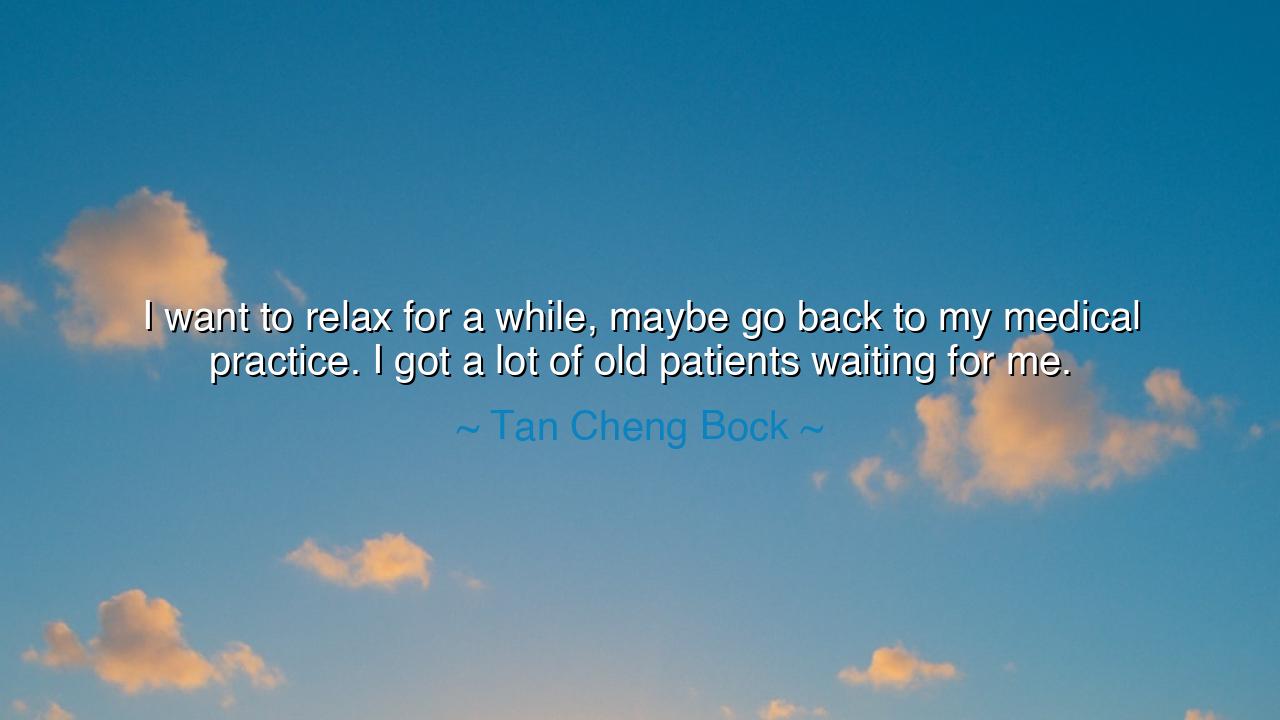
I want to relax for a while, maybe go back to my medical
I want to relax for a while, maybe go back to my medical practice. I got a lot of old patients waiting for me.






“I want to relax for a while, maybe go back to my medical practice. I got a lot of old patients waiting for me.”
So spoke Tan Cheng Bock, physician and statesman, a man whose life has been a bridge between service and humility. These words, spoken after years of public duty, carry not just the simplicity of retirement, but the weight of returning to one’s true calling—the deep and sacred desire to serve where the heart first learned compassion. In them lies the wisdom of the ancients: that greatness does not lie in power or fame, but in faithfulness to one’s purpose, in the unending cycle of giving, resting, and giving again.
In this statement, Tan Cheng Bock reveals a truth that is as timeless as it is tender—the longing to return home to the work of the soul. His medical practice was not merely a profession; it was his beginning, the soil from which his sense of duty and humanity first grew. To say he had “old patients waiting” was not merely to speak of those who awaited his care, but of the bonds forged through decades of trust, kindness, and shared mortality. His words remind us that even as men rise to positions of influence, they remain most complete when they return to the roots of compassion.
Like the philosopher-kings of old, who ruled not for glory but for service, Tan Cheng Bock embodies the virtue of returning to simplicity after honor. In the ancient Chinese texts, there is the story of a sage named Tao Qian, who, after serving the emperor, cast off his robes of office and returned to his fields, saying, “I will not bow for five bushels of rice.” He found peace not in recognition, but in the rhythm of ordinary labor. So too does Tan’s reflection echo this truth: that the measure of a life well-lived is not in the applause of nations, but in the quiet good one leaves in the lives of others.
There is a profound humility in saying, “I want to relax for a while.” It is not weariness that speaks, but wisdom—the recognition that even those who lead must rest, that one must refill the vessel before pouring again. The wise of every age have known that after seasons of great endeavor, the soul must return to stillness, to nature, to the first love that made all other loves possible. Rest is not retreat—it is renewal.
And when he says, “I got a lot of old patients waiting for me,” he reveals something even deeper: that duty does not end when the title fades. For a true servant of others, service is not a position—it is an identity. His patients symbolize all those whose lives he has touched, and who, in turn, anchor his own humanity. In their waiting, there is affection, memory, and gratitude. To return to them is to return to one’s truest self, stripped of pomp and politics, clothed again in kindness.
The ancients would have called this the circle of virtue—to begin with compassion, to rise with purpose, and to return again to compassion. Such is the pattern of a noble life. Many chase the heights of power, but few remember to descend with grace. To retire into humility, to serve again with quiet hands after commanding with mighty words, is the mark of a heart uncorrupted by pride.
From these words, let us take this lesson: never lose sight of where your purpose began. Whether in medicine, teaching, craft, or care, remember the faces that first gave meaning to your work. The world may tempt you with greater platforms and louder praise, but your truest calling lies where your service first touched lives. When greatness is finished, let gentleness begin again.
So, to those who labor under the sun of ambition, remember this truth of Tan Cheng Bock’s heart: honor is fleeting, but kindness endures. When your journey through the world’s clamor is done, return to your beginnings with peace. Let your hands heal once more, your words comfort, your deeds bless. For in the end, the highest legacy is not the power we wield, but the love we return to—the quiet work, the waiting souls, and the life that has come full circle.






AAdministratorAdministrator
Welcome, honored guests. Please leave a comment, we will respond soon